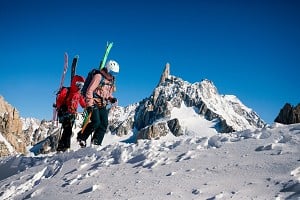
Lynn Hill needs little introduction. As a pioneer of free climbing in the 80s and 90s, Lynn is regarded as one of the most accomplished climbers in history; male or female. Having made the first free ascent of The Nose on El Capitan in 1993 and a free ascent of the same route in a day just one year later, her free climbing feats remained unrepeated for over a decade.
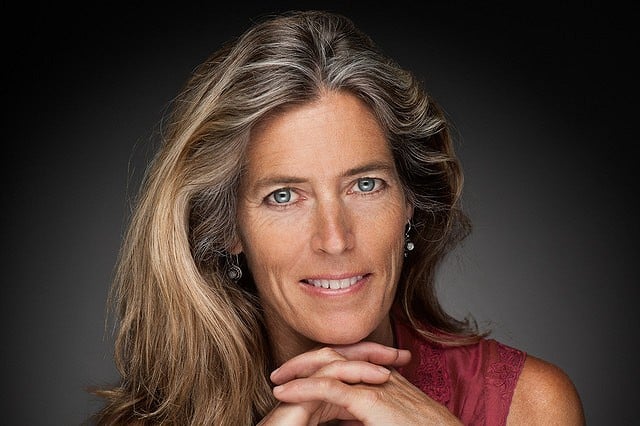
Aside from her big walling achievements, Lynn is also one of the most successful competition climbers of all time, winning over thirty international titles and competing alongside some of the most prominent female athletes of that era, including Catherine Destivelle and Robyn Erbesfield. Long an advocate for gender equality in climbing, Lynn is credited with inspiring women to take up the sport and has spoken openly on the topics of participation and parity for female climbers.
Now aged 56 and based in Boulder, Colorado, Lynn combines her passion for climbing with her duties as a mother to Owen, aged 13 and her many coaching, speaking and writing commitments in light of her status as a 'legend' of climbing.
Using her autobiography Climbing Free: My Life in the Vertical World as a reference point, I asked Lynn about her upbringing in California, her background in gymnastics and of course, about The Nose, alongside her views on where modern day climbing is heading...
'I'd rather be free and choose my goals naturally like I did when I first started climbing. I’ve chosen to guard my freedom to continue being the climber that I’ve always been.'
Your parents took you on camping trips and introduced you to the outdoors. At the same time you had a background in gymnastics from a very young age. You could say you had a perfect introduction to climbing, perhaps?
My introduction to climbing was completely different to that of today's generation of gym climbers. If you want to be the best climber today, it helps to start young. Look at who's doing the best right now - look at all the children of parents that climb who started very young, that's who is dominant in the scene right now.
Many climbers today start off in gyms. Do you think there are key skills and an appreciation for the outdoor environment that are missed out on by beginning climbing this way - a different breed of climber?
I think you have all types of climbers, but I would say that because of the heavy emphasis on the climbing gym, the kids are not really introduced to the outdoors in the same way and with the same association of climbing. For me, what was really important was the sense of freedom along with the beauty, because when you were in these beautiful places they weren't crowded, at least not back in the day. There are so many people in the world now everywhere you go that people don't even realise that there are such places. They don't have an appreciation because they just don't know about them. You can get to quiet places, but you just have to go further. People don't put that high on their priority list if they're training for World Cups or pursuing climbing at a high level.
For recreational climbers it's a different story. I think many people still love getting outside, especially in America. We do have a strong culture of traditional climbing still, even though sport climbing has taken off. We also have an appreciation for nature as we have such awesome National Parks.
You come from a family of 7 children and write that from an early age, you learned to 'engage in your own world and figure things out for yourself'. Your mother claimed that you 'marched to the beat of a different drummer.' How much do you attribute your independence and self-confidence in climbing to your upbringing?
I do think that I learned to be responsible for myself and independent being in that environment in a large family, but I also think that I had the temperament to figure things out and the curiosity to engage myself in that way. I enjoyed the process of figuring things out. I also tied my shoe at the age of two and I insisted on doing it! So I think there's a little bit of both nature and nurture in my story, but climbing certainly helped reinforce those qualities and self-responsibility was even pretty much celebrated back in the day. We tried to do routes that required us to make decisions about risk, calculating 'do I have enough protection for this stretch of rock?' or sometimes you'd simply cast off into the unknown. We were very strict, very much like the British - in fact I think we borrowed from each other - with that early culture of boldness and taking calculated risks.
When you're really sticking your neck out, you must be fully responsible for yourself and if you make a mistake there's nobody to save you. You learn to take those risks, when it feels right and when it doesn't. I don't actually remember backing off of any climb, I just did whatever necessary to do climbs that I thought I could do. I was willing to be adventurous and I think that's something that's a little bit lost in the sport climbing scene just now. I think that sport climbers and boulderers are pretty bold sometimes too, but people don't pride themselves in that style of climbing as much anymore.
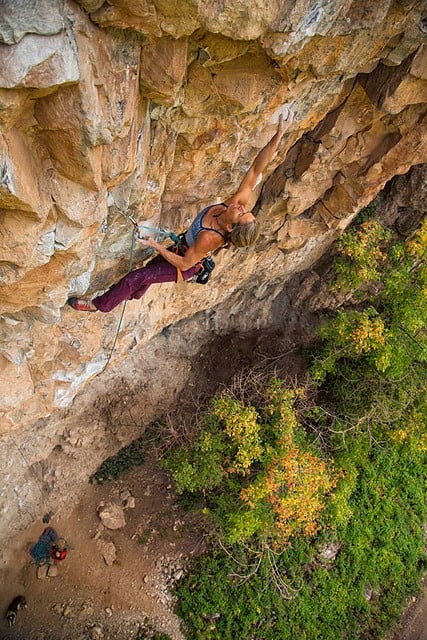
I guess what I mean by that has to do with the ego. If you let your ego and the pressure that you put on yourself get in the way. In my experience, I was often a contender to win, so there was a lot of pressure and although I was capable of winning, I couldn't win all of the time. You can have a winning attitude, though, and that is accepting whatever fears might come up instead of resisting them. You accept them and say 'It's OK, whatever happens I'm just going to try my best!' I call this the mental shift, so I interpret the red flag of 'Oh I'm tired' or 'I don't know what to do here' and then refocus on engaging in the moment at hand and being fully present. If you let pressure and anxiety get in the way of actually listening to your intuition and doing the right thing at the right time, you probably won’t be able to do your best!
You describe climbing competitions as making you conform to a 'rather restricted experience in life' despite being a great experience on the whole. What was it about competing that you enjoyed?
I enjoyed the challenge of having to perform on demand on a climb. When the moment to perform your best comes you have to keep yourself together and make the right move. I liked that excitement. Obviously at the time it was much more profitable to be a competition climber, so I also made money! I wouldn't say that the sponsorship money was better, just the prize money was better, but now that it's controlled by all the politics of the associations and committees so it's just controlled differently. The funny thing is, I look at the way the competitions are now and the skillset the kids have, maybe it would have been good if I had started in the gym. With the skills I have today, I wouldn't even be competitive! It's just so different - it's more like parcour merged with gymnastics!
'I can appreciate the Olympics for what it is, but it's not a lifestyle; something that you're going to do for the rest of your life.'
Your path into climbing and your progression seemed very natural and not based on specific training and exercises like many of today's climbers. How much do you credit your success to natural talent and self-belief? Do you think today's focus on strict training and diets would appeal to you if you were to do it all again?
I did train a little bit, but I wouldn't say it was like training on today's artificial walls. I was mainly training on rock. Climbing can be a form of training, but it was not at all at the level of today's athletes in terms of numbers of days in a row. I used to climb two days on, one day off - maybe three days if I was taking it easy. I considered it vacation climbing, and I’m lucky to have had the chance to be on vacation over in Europe, living in France and eventually Italy. I had the time to integrate into their cultures and I learned to speak those languages. For me, climbing and living abroad was more of an adventure than a sport. It was still an athletic activity and I do appreciate that aspect, but it's not like today where climbers are trying their best to get ready for the Olympics, so it was a completely different mindset.
As for my success in competitions, I guess there was some natural talent, but there was also all that experience on rock that helped me - even though artificial walls are much different, it's still about recognising the shapes and putting your body in the right position to be efficient. I had a lot of experience and self-belief, which always helps. I knew what I was capable of and I think that might actually have come from the trad days when you had to be good at calculating the risks and your abilities.
Regarding diets, that wouldn't appeal to me as much, but we were also a little bit neurotic in those days regarding fat. Climbers generally tried not to eat much fat in our diet, but ultimately if you're not eating a balanced diet you're going to be hungry and end up eating more of what you shouldn't be eating!
You write 'As gymnastics became more rigid and structured, I began to lose my motivation and enthusiasm for remaining on the team,' whilst 'climbing was beautifully free form and spontaneous'. Would this be true for you of competitive climbing today, as we move towards the Olympics? Are you pleased or concerned in some way about climbing's Olympic status?
The Olympics is a very specific period in an athlete's life, when young athletes are at their peak and obviously they're going to have to commit a lot of time and centre pretty much their whole life around training. I can appreciate it for what it is, but it's not a lifestyle; something that you're going to do for the rest of your life. I have seen some older climbers who are pretty regimented about the way that they live, so a bit of that could rub off. Once you become that compulsive about things like food and exercise, it may develop into a way of living. I don’t think I would like that regimented approach to climbing since I prefer the novelty of travel and going to new places and doing new routes.
In your book, you tell the story of your 75ft ground fall at Buoux, France in 1989 and how it made you reflect on parts of your life which climbing had diverted your attention from, such as your family and friends. What were the emotional and physical repercussions of your fall - what did you learn from it?
I was purposefully vague about it in my book because I didn't want to hurt the feelings of people I had intimate relationships with, and one person at that time of my life was my husband. There were things going on that didn't feel right, but when you're young and you've built your life around a person, it's hard. Also, climbing was so unique compared to mainstream culture that there weren't many people that I thought would understand me. I guess it was a case of 'we'll continue and see how it goes' and that attitude of 'see how it goes' is sometimes a big red flag. I was starting to realise that that this attitude was not going to work. It was a wake up call really. After my fall, I learned to pay attention to myself rather than just focussing on other people's needs and I still struggle with that today. I'm constantly being pulled in different directions and I have responsibilities as a mother and I also have a dog, cat and ball python! I juggle my time and try to protect myself from being oversolicited because if I don't, then I'm no good to anyone. It's the continuous balance of give and take, because if you're in my position, people everywhere want a piece of me!
'I was often disappointed by sexist attitudes outside the climbing scene, but it made me even more annoyed to see them among climbers. Perhaps it was because I felt that climbing was the first truly egalitarian activity I had participated in.' You continue: 'I realised that no matter what our physical differences, with the right combination of vision, desire and effort, just about any climb was possible. Short or tall, man or woman, the rock is an objective medium that is equally open for interpretation by all.' Do you think there are still sexist attitudes in today's climbing scene? Has anything changed?
This is what I think about sexism and chauvinism. I think it's deeply ingrained in the subconscious and people don't even realise they're acting that way. Subtle things, little comments that people make that end up making you feel like 'Wow, that's pretty demeaning and arrogant to make such comments!' but it's not really an issue that I'm struggling with personally right now. How much women make versus men outside the climbing community is still an issue that I’m concerned about. I’m also curious to know how big the disparity of income is between the top men and women climbers and outdoor athletes, but it’s hard to know for sure since this is not publically disclosed information. I think that subconsciously men are given opportunities more often than women in this industry since most of the decision makers are men, usually.
Ideally, there could be some unity among women to support other women, but sometimes that's when it's disappointing when women don't support other women and instead they show that “catfighting” mentality. I say, 'Come on!' We have been at a disadvantage throughout history - so let's work together to help each other be stronger. Helping somebody, even if they're your competitor, makes everyone stronger! That's also where I'm different as a competitor - I remember teaching everything I had learned in competition to Robyn Erbesfield when she and I were on the US climbing team, it was just the two of us. There was no support from our alpine club or any companies in the outdoor industry. She went on and won the World Cup four times I think and now her kids are doing really well, too.
'If you feel like you want to climb 5.14, get after it! That's what I did. There were men around who said 'Oh, that's not possible - a woman can't do that' and I looked at them like 'What?!''
You can't argue that there are differences between men and women, both in our physique, our hormones and the way our brains are wired. You're not comparing apples with apples. The achievements of women like young Ashima Shiraishi - just look at the routes she's climbed. She has a particular style and she can do particular things at a super high level - as high as any man - and I think she'll get even better over the years, but my point is that you can arbitrarily say 'these are the routes and problems that are going to determine the best in the world', and if they seem to favour someone with a lot of power, men would probably do better as they're bigger; they have more testosterone and they can jump farther. However, if the routes are more technical with small holds and different techniques like slab climbing, then I think a woman is probably going to do better!
There's a mixture of qualities that will favour one or the other and we can all be equally good on different types of routes. I also think that self-belief really helps. If you look at my generation and those before me, at how differently people thought about what women could do - it's even worse exponentially as you go back over the years. They really did not think women could do strenuous physical exercise. I’ve always thought that this was a ridiculous way to think. If you want to do something challenging, you’ve just got to go out and start doing it! If you feel like you want to climb 5.14, get after it! That's what I did. There were men around who said 'Oh, that's not possible - a woman can't do that' and I looked at them like 'What?!'
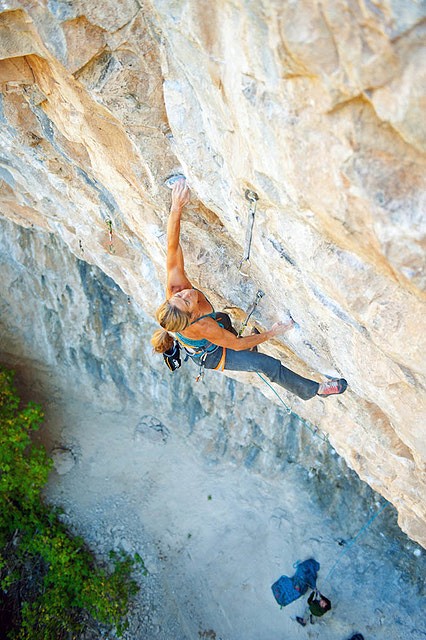
I think that's part of a difference in temperament between men and women. Women are - I think - happier to just see progress and enjoy working hard routes and problems and I think men feel that they have to be leaders. There's so much more pride and satisfaction if they do first ascents and they don't mind all the work involved. I think if women had more pressure maybe, or felt that they should do it, then they might start doing more, but there aren't that many women doing new routes at the moment, especially in the mountains. I think that'll come over time.
'I don't want to feel the pressure to post or boast about my activities or achievements or for it to be required in order to count for money. I like to share in the way that I like to share, but I don't want to have to do ten posts a week just to gain attention.'
Do you think it's harder for climbers today to follow their own path when so much is shared and compared on social media? Is there more pressure from sponsors to tick hard established grades, perhaps, rather than taking the time to establish routes which may not come to fruition?
Yes, I think the social media aspect is tricky, especially for a pro climber, and this is one reason why I'm not a professional climber anymore - I don't consider myself to be one, anyway. I don't make my living from climbing, and I don't want to feel the pressure to post or boast about my activities or achievements or for it to be required in order to count for money. I like to share in the way that I like to share, but I don't want to have to do ten posts a week to gain attention since I'm just not interested in that. It could be a generational thing, I just don't want to spend my time that way. It's not who I am! I don’t like being asked to do something that - for me anyway - is outside my lifestyle, philosophy and approach to climbing and life. I don't think it's a bad thing to do sometimes, but it can be like an addiction and lots of people are super addicted to their screens and forget to be engaged in life. I think that the pressure to constantly post on social media also influences the things they choose to do as a climber. They want to have this one-liner statement that catches people's attention and so that becomes how they choose their goals and what defines their experience. I'd rather be more free and choose my goals naturally like I did when I first started climbing. I’ve chosen to guard my freedom to continue being the climber that I’ve always been.
There's an unspoken pressure to get attention and the way you get it is through ticking hard grades or being the fastest or maybe establishing a new route, especially if it's in an exotic, beautiful place. It's always going to be interesting to look at photos or video of beautiful places and it's hard to get away from that old paradigm, because it works to get attention and sell products. It's not the only way to define yourself, but it is an easy sell!
'There are more people in the world and we need to manage all of the responsibilities that go along with it. It's not fun but these are issues that we should all take some responsibility for.'
You found yourself between 'the great pioneers of previous generations and the sport climbing champions of today.' Did you personally experience clashes between these two influential groups?
I think traditionally there's been this conflict with the old generation not wanting to accept the changes, but I feel I've always been a medium between generations in a good way because I can see what is being lost: pristine cliffs are now overcrowded, but there's a beauty in the whole scene of climbing today in that we now know what's going on on the other side of the world and we can plan trips to amazing places. If we didn't have the development and infrastructure of climbing, we wouldn't have that, and now we have compostable toilets and bathrooms in some climbing areas and it's nice that we're taking care of all the responsibilities that come with the increasing numbers at the crags.
The ethics from my generation to the millennials have changed: everyone wants to have a good time, but they don't want to do the work. They want to have the good part and not have to pay for anything! Perhaps there is a clash of viewpoint from the older generation to the new one. While this generation continues to enjoy taking all the advantages, they are also going to inherit a world that's got some problems like pollution and climate change. This is a big problem that we will all share for generations to come!
You were climbing with the group known as the Stonemasters - you were mostly climbing with men. What did you learn from these 'long haired luminaries', and which characters stood out for you in that scene?
Well, the Stonemasters for me represented the boom of free climbing: the goal was to climb the hardest route possible, to keep pushing that free climbing level on the boulders and the routes at our local crags and places like Yosemite. We weren't thinking about bolts per say as the tool to do it, but ultimately sport climbing brought the level of free climbing even higher. Our motto was to “Do the most with the least”. We did some pretty hard rock climbs back in the day with far less efficient gear. In 1979 - I think - we did one of the first 5.13b’s in the country before it was even recognised as a legitimate grade!
Some of the people I hung out with were characters such as John Long, Jim Bridwell, Ron Kauk, Jon Bacher, John Yablonsky, Dean Fidelman, Mike Lechlinski and Mari Gingery and a whole host of other people who were a part of the scene. Some of them don't climb anymore but most of them do - not at the level they used to, though. Mike and Mari live in Joshua Tree now and I still go and visit them.
'The pressure must have been even greater for any man who wanted to come and free climb The Nose after me, since you've got nothing to lose if you're trying to do something that’s never been done.'
'What lies behind us and what lies before us are tiny matters compared to what lies within us.’ Your mental fortitude on your free ascent of The Nose seemed to complement your high level of technical and physical aptitude perfectly. Do you think you approached the task differently to how the men before you were approaching it? You say you are a climber focused on 'aesthetics rather than summits' - was climbing 'in the moment' rather than focusing on completing the ascent the key?
Yes, I think I approached it differently than the men at the time. I knew that climbing was in its infancy in terms of what could be done in the future. The people who were going to Yosemite were doing the classic ascents. Most climbers who came to the Valley weren’t saying 'I'm gonna free climb this piece of rock bottom to top in one go!' I came up with this idea as a result of my experiences sport climbing in Europe. I developed some unique skills during my years as a competition climber in addition to having the experience of climbing on various types of rock when travelling to different places throughout Europe and the world. Today, competition climbers could go all the way to a place as far away as Japan and perform for only ten minutes!
Bringing that all together on The Nose, I think I brought a unique perspective to the world of climbing in Yosemite. For me it was a logical next step to make an all free ascent of The Nose in one day. How I did it differently than a man had to do with my feeling that I had nothing to lose. Even though I failed on my first attempt, once I'd done it, the pressure must have been even greater for any man who wanted to come and free climb it, since you've got nothing to lose if you're trying to do something that’s never been done. There's more to lose once it has been done. There's also personal pressure when you know that it’s possible and you have the desire to succeed. It’s important to stay engaged in the moment, otherwise those thoughts can be a distraction.
I'm not perfect in that sense because I do have an ego and the desire to achieve whatever I set out to do. Goals are helpful for inspiring me to become stronger, more efficient, and mentally resilient. What matters most is having a good time with my friends, trying hard, and not getting hurt in the process! At this point in my life, it’s not worth taking risks that could result in lifelong injuries. I don't really feel obliged to tick off as many hard routes as possible. It’s fun to do hard routes, but I don't feel I have to do it to prove anything to anyone. I just go climbing because I like it, and that’s enough!
You talk about the 'cult of El Capitan' and the people who abandoned material comforts in favour of character building climbs. Do you think the El Cap scene has changed much since your time there?
I have been back, not so much on El Cap, but I've been in the Valley in recent years. It’s rather ironic that the last time I was on The Nose, was on a top-down ascent with a team of photographers and climbers for a Google Maps project. They took pictures that allow the viewer to navigate around the scene; if you see me on the Great Roof, you can look around 360 degrees from where I am positioned on the wall. This was certainly a modern experience on El Cap compared to my experience in previous years! The guys who were hired to do the rigging and bring all of our sleeping gear down the wall are just as committed to the climbing lifestyle today as we were back in my day. Now it's probably a little easier to make money, but then again it's a lot harder to not have money and get by, so that part has changed slightly, but the same sort of spirit towards living the dirtbag lifestyle is still alive today.
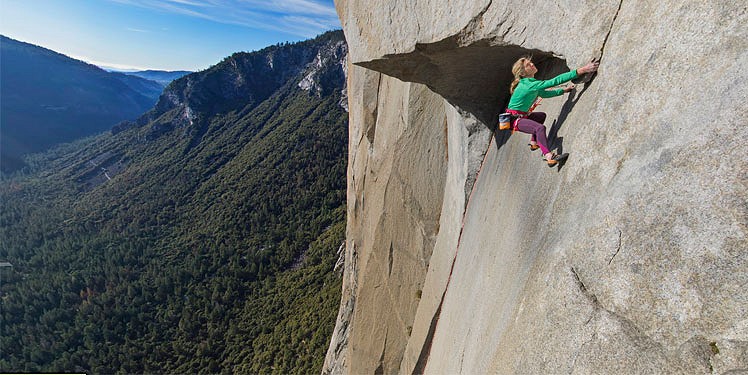
The mainstream media and 'outside world' showed a remarkable interest in the Dawn Wall's first ascent. Could you ever have imagined such events when you were living and climbing in Yosemite? If you were making the first free ascent of The Nose today under similar circumstances, how would it change the experience for you?
The whole Dawn Wall thing blew up because you can get better cell reception on El Cap than you can in the Valley, so they were just posting social media updates because they are pro climbers and it's a novel place to be, so why not? In that respect it was cool, they were posting daily and they began to get a huge number of followers. One in particular was a journalist in New York who had a news distribution network with links around the world. The media loved the story of determination and sacrifice that this ascent represented. Who wouldn't want to see a picture of someone on El Cap hanging onto 'tiny fingertip holds'? It was a great story and I’ve had numerous conversations about the Dawn Wall and its impact in the media - both when it was happening and still today. One big difference between the attention this story got versus back when I did the first free ascent of The Nose, was the fact that there was no internet back then! There was a scene in the film about my free ascent of The Nose and you see me using an old rotary phone! In 1994, I ended up having to help produce the film of my free ascent of The Nose in a day, so I was managing all of the logistics from the permission to film, to the lodging, food, and hiring help for the film crew!
'I never would have imagined the internet explosion that occurred in the years that followed. I was asked to write a story about my ascent but I hardly had any photos!'
Nowadays, on film productions like the one on the Dawn Wall, they have the support of other climbers who help ferry loads and bring up fresh pairs of shoes with perfectly prepared rubber edges - they had all the support they needed, whereas I had very little support! I never would have imagined the internet explosion that occurred in the years that followed. I was asked to write a story about my ascent but I hardly had any photos! Brooke and I took a few, but I was able to get a few nice shots the following year, when Heinz Zak arrived in perfect timing at the summit of The Nose one morning. We couldn’t film that day because there were no more charged batteries. I was planning on resting, but this was a period when I wanted to train as much as possible. I felt like I needed to keep training in order to have enough endurance to free climb the entire route in one day, so when Heinz asked if I would go down on the wall and take some pictures, I agreed to do it! In addition to getting some nice photos, it also helped for me to review the moves on the crux pitches!
You describe your experiences of taking part in TV shows and competitions and adverts, but mention that your 'flirtation with Hollywood was beginning to feel demeaning.' It seems as though climbing is currently going through a second wave of media attention – the buzz around free climbing initially, and now with indoor climbing and the Olympics. How best can climbers interact with the mainstream media?
I think it's up to the people in the limelight to be themselves and to be the best representation of a human being - whether you're a man or a woman - and show good sportsmanship and the fun side of climbing. I know those climbers train really hard - they're having fun and they love it. I would prefer to see climbers who are not too narcissistic, and who share their experiences with other people in an inspiring way. Sometimes people in the mainstream media ask you to do hokey things and you can say 'I don't like that!' and if you're asked to say things on camera - which I have been at different points in my career - you can say 'No, I don't feel comfortable with that' and listen to your heart, don't let those people override what you want to say.
You studied alongside your climbing career and were determined to 'do something more meaningful' with your life than 'such a self-serving activity as climbing.' How important was it to you to have avenues outside of climbing, since you describe yourself as having a 'tunnel vision' approach to the sport?
I think it's really a big challenge for somebody who is so passionate about something like climbing to have a balanced life, as it's such a big part of most climbers' lives. Balance is important and I do think about the balance of give and take and doing something for other people and sharing in the way that I do, such as by talking to you. What I thought I'd do with my education was to become a physical therapist and I looked into it and realised that I had more unique skills that would allow me to do something different and creative rather than going down the traditional route. Instead, I just kept following climbing. I'm currently working on a climbing technique video that I hope will be interesting for people to watch. I've finally managed to extract the process of climbing out of my brain so that I can help teach those skills to other people. I've analysed it - I'm both intuitive and very analytical.
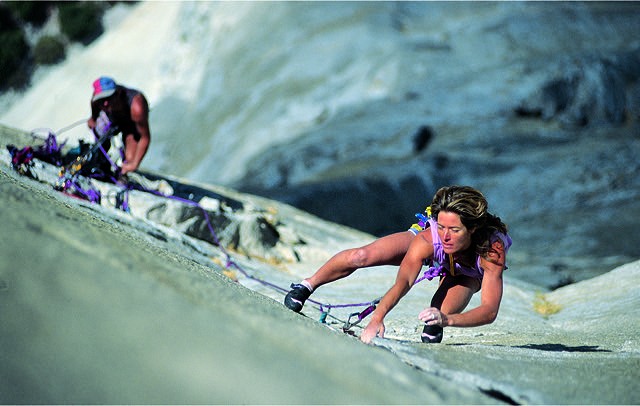
The way I look at climbing, I can really see what's going on; if I watch someone climb I can dissect what they're doing and what might have been a more efficient approach immediately because I've been studying it - I call this video project my PhD of rock! My goal is to show and explain what is good technique, why we do what we do, and in what types of situations. Though each person has a different style and approach, we must all follow the same laws of geometry and physics. Even people of the same size may do the same problem in a different way. I'm using graphics to show some of the forces and techniques involved when climbing on all angles of rock from slabs to vertical faces, roofs, corners, and overhanging faces. I will probably just distribute this video online since this seems to be the modern way to do business!
‘I didn’t learn about climbing from a book, I learned by doing it!’ You seemed to rely heavily on intuition when climbing and write about climbing with a 'relaxed face' and 'soft grip' to conserve energy. Can you develop on this? Is it a skill/climbing style that can be coached?
I think you can remind yourself of what you admire and believe in. We form our thinking by choosing to think about life in a certain way, so the more you reinforce your ideas of what you want and who you want to be, the more you reinforce those qualities in yourself.
You lost many friends through mountaineering and climbing, and claim that you personally were happy 'to do more with less' rather than push yourself to the edge in alpinism and mountaineering. Since your trip to Kyrgyzstan and writing your book, have your views changed at all? Have you tried any alpine rock routes since?
No, I'm a mom so I feel like if I went into that high altitude terrain I'd be gambling too much. Climbing can be dangerous enough as it is, even if I try to be as safe as I can be. When I went climbing the other day and I was walking underneath the base of the cliff, I felt uncomfortable knowing that if someone kicked off a rock or dropped a piece of gear, it could easily hit me on the head. Life is full of surprises and you can get hurt in many different ways. Everyone's going to die, so you can't be too paranoid, but as a mother I try to be reasonable and this is why I haven't gone back to places like Kyrgyzstan.
'Since I’ve become a mother, I consider myself a more reasonable risk taker - not that I was unreasonable before, but I don’t choose to do climbs that I consider too dangerous.'
You have a young son - has he followed you into climbing? How has having a child changed your outlook on life and climbing?
Owen is 13 and he'll be 14 in April. He says he doesn't like climbing, but I think it's more that he's not into climbing. He goes on occasion but he doesn't want to try too hard to work out the moves - he's not curious about the problem solving aspect of climbing. He just likes swinging on the rope, going camping in beautiful places, and being with other kids. That's the only kind of climbing trip he’s interested in.
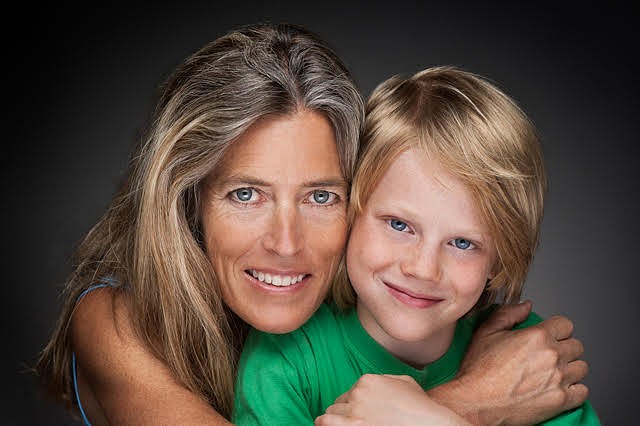
Since I’ve become a mother, I consider myself a more reasonable risk taker - not that I was unreasonable before, but I don’t choose to do climbs that I consider too dangerous. Apart from that, I guess my lifestyle has also changed. I'm more consistently at home and although I do still travel for work, I don't like to leave for more than a week at a time. My dog doesn't like it at all since he's so regimented! He wants his daily walk morning and night! My son also needs stability at this time in his life so I’ve chosen to change my lifestyle to accommodate these needs. In a couple more years I'd like to go on more climbing trips. Hopefully I can figure out how to balance my work and family obligations so that I’ll have the freedom to do that in the future!
What are your current goals and ambitions in climbing – do you still enjoy pushing your physical limits?
Right now I'm just trying to keep the balance so I can stay healthy and climb. I would like to try to get in better shape this year, but it's a struggle when I'm working on several things at once and when I'm travelling it's really hard to do. I'm climbing a little stronger than I was earlier in the year. I like to skate ski as well - that’s one of the best cardiovascular exercises I’ve ever done!
Have you climbed in the UK? If so, where?
Yes, but not a whole lot. I went to Pabbay and I've been to Sheffield and climbed on the gritstone just a tiny bit. The weather wasn't ideal, it was just a little bit wet! I went to Stanage on a cold day and did a few boulder problems, I guess that's about it. I should add it to the list...
What's next for you?
I want to make a little prototype climbing wall in my backyard. I don't have a big house so I can't do it inside. I think I can make an outside space with protection from the elements. That'll be a fun project. I haven't actually started on the process of design, but I have a structure in mind so I'm looking forward to doing that when the weather's a bit more stable. I'm going to make my own hold shapes. It's intimidating to start such an ambitious project! It’s like standing on the edge of a big abyss. I ask myself, 'Should I go for it and jump?' Step by step - just like every other big objective - when the time is right, I’ll jump in with full commitment!
- INTERVIEW: Albert Ok - The Speed Climbing Coach with a Global Athlete Team 17 Apr
- SKILLS: Top 10 Tips for Making the Move from Indoor to Outdoor Bouldering 24 Jan
- ARTICLE: International Mountain Day 2023 - Mountains & Climate Science at COP28 11 Dec, 2023
- ARTICLE: Did Downclimbing Apes help Evolve our Ultra-Mobile Human Arms? 5 Dec, 2023
- ARTICLE: Dàna - Scotland's Wild Places: Scottish Climbing on the BBC 10 Nov, 2023
- INTERVIEW: Loki's Mischief: Leo Houlding on his Return to Mount Asgard 23 Oct, 2023
- INTERVIEW: BMC CEO Paul Davies on GB Climbing 24 Aug, 2023
- ARTICLE: Paris 2024 Olympic Games: Sport Climbing Qualification and Scoring Explainer 26 Jul, 2023
- INTERVIEW: Malcolm Bass on Life after Stroke 8 Jun, 2023
- ARTICLE: Alexandr Zakolodniy - A Climbing Hero of Ukraine 26 Apr, 2023



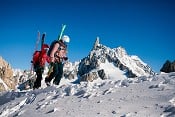
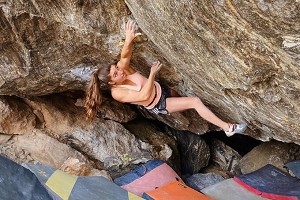
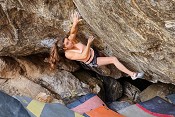
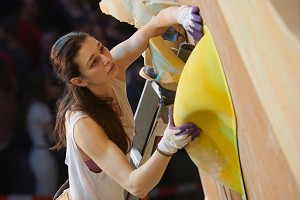
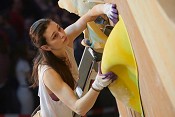






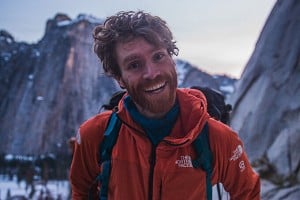
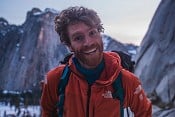
Comments